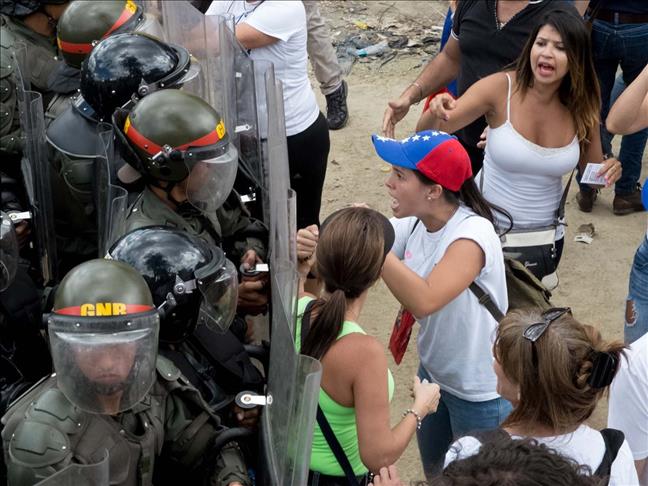
SAO PAULO
Venezuela's National Assembly has demanded a criminal investigation into opposition Deputy María Corina Machado related to the country's ongoing anti-government protests in which 29 people have died, local media reported.
On Tuesday, Venezuela's majority Socialist Party voted to request the state prosecutor investigate Machado, 46, on charges ranging from treason and terrorism to murder and inciting civil war.
The legal process could eventually strip the opposition lawmaker, an outspoken critic of President Nicolás Maduro, of her immunity from prosecution afforded under the Andean country's constitution.
Machado has been one of the most visible opposition leaders during the current protests, which began over six weeks ago and have seen the worst violence in the country in a decade.
Machado, an engineer, is a member of the center-right Vente Venezuela party, which forms part of the opposition coalition known in Venezuela by its Spanish initials, the MUD.
“We will not allow impunity. We will guarantee revenge over these deaths. Anyone violating the right to life is also violating the constitution,” said Deputy Tania Díaz, a member of the ruling Partido Socialista Unido de Venezuela or PSUV, of which Maduro is also the president.
The National Assembly, or Congress, was shown a video which detailed Machado's past decade of anti-government activism and evidence of links to the United States, whom President Maduro has accused of inciting unrest in the country and bankrolling a coup d'état in line with rhetoric from his predecessor, the late Hugo Chávez.
As the evidence was shown, Machado was seen shaking her head. Others in Congress chanted “Justice!”.
In a later press conference Machado said Congress's actions amounted to a “threat” and called on the opposition to keep protesting in the streets.
“I'm convinced that this attack against me is the product of a regime that is petrified by an unprecedented popular movement. They're determined to break us. We are determined to win our freedom,” Machado said.
-A month without López
The MUD opposition lost to Maduro and his socialist PSUV party by a hair's breadth in 2013's general elections, which were sparked by Chávez's death.
Another opposition party leader, Leopoldo López – head of the Voluntad Popular party – is marking a month behind bars on charges of inciting violent protests, which left three dead on February 12.
Along with López, Machado help forge localized, sporadic protests into a national opposition movement under the banner of La Salida – Spanish for both “The Exit” and “The Solution” - with the aim of bringing an end to the country's 15 years of socialist rule.
Commentators say that Machado being forced out of Congress would strike a severe blow to the opposition politically, given she is such a well-known figure for the anti-Maduro campaign, and could also bring more people out onto the streets to protest.
Indeed, some members of the opposition have called for a national protest against the government this Saturday, March 22.
Machado has a far more confrontational style than overall opposition leader Henrique Capriles, of Primero Justicia, and has been frequently dismissed by Maduro supporters as a wealthy élitist incapable of relating to underprivileged sections of society.
The protests, which began in the western city of San Cristóbal, sought to raise awareness of soaring crime levels, but soon spread to the capital, Caracas, where the list of grievances grew: to the unavailability of many basic goods, the world's worst annual rate of inflation and the increasingly limited freedom of speech. Lately they have led to calls for President Maduro to resign.
They also grew in violence, with the National Guard using rubber bullets and water cannon to disperse gangs of student protesters armed with stones and petrol bombs.
Both the government and the general opposition have accused each other of using armed militias.
President Maduro has labeled the violence a “coup” and an attempt by “fascist” groups to remove him from power.
englishnews@aa.com.tr


